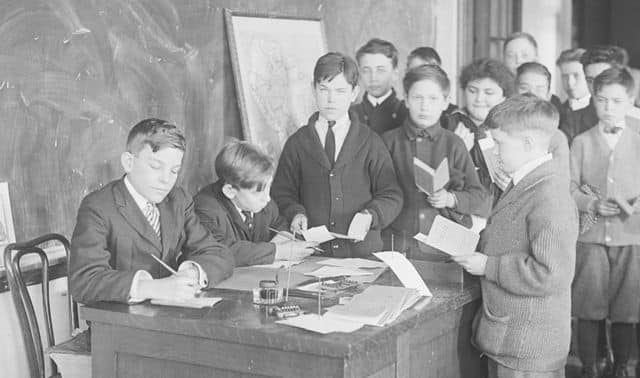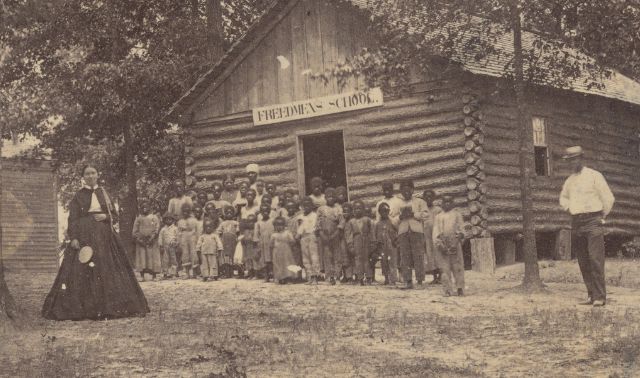|
Group Thinking
Interested in a particular topic or place? Look for websites that have pulled together digitized materials from many academic and other libraries into searchable online archives full of genealogical treasures. Examples of such sites include:
|
The old college try
You never quite know what you might find in your local college or university library. For example, the one at Marietta College, a small private college in southeast Ohio, has the original 1810 census for that part of the Buckeye State. It’s the only complete 1810 census known to exist for any part of the state. Another gem: A 1798 tax list for Waterford Township in Washington County, Ohio. Not only did this particular taxman list freemen, lodgers, servants, land and other taxable possessions, but if you flip to the back of the booklet, you’ll see he included the names of every person—even women and children—in each household.
School zones
Make a list of academic institutions to explore and peruse each library’s website for materials of genealogical interest. Look for the words special collections, historical, digitized and rare books. Search the site for the word genealogy to find resource guides such as West Virginia University’s.
Search the library catalog, too (try adding the word genealogy to your searches). Librarians do their best to make materials accessible. Although some collections are indexed and entered into the catalog, others, because of time and budget limitations, might end up merely boxed, labeled and stored. Most libraries’ online catalogs offer fairly complete listings of holdings, but some items may end up cataloged under generalized headings such as “Brown Family Papers.”
If you’re lucky, you’ll locate online finding aids for collections of interest so you can see whether they’ll be useful. A basic finding aid includes the collection title, its type of contents (manuscripts, photos, audio tapes) and size (such as “five linear feet”), location, accessibility and any restrictions on its use. You also might find an abstract of the contents, information about the people or organizations named in the records, and, if you’re really lucky, detailed descriptions of each item in the collection.
For example, the Northwest Digital Archives is a website comprised mostly of finding aids for library collections in Idaho, Montana, Oregon, Alaska and Washington. The site also links to many digitized original documents from more than two dozen colleges and universities, plus museums and historical societies. (To view digitized collections, click the Contact Us link, choose an institution, then go to the Special Collections page.)
Campus visit
Next, make sure the library is open to the public, not just to students and professors. Most institutions’ main libraries are; though you may need to register. If you’ll want to borrow books, find out how to get a library card.
Academic libraries, especially manuscript and special collections departments, often require an ID check or make you fill out a form before you can go in, so have a photo ID with you. Keep your belongings to a minimum, as your bags might be inspected.
Keep in mind that educational libraries often change hours depending on whether school is in session. Call ahead to verify the hours when you plan to visit, especially if it’s during a weekend, holiday or school break. Ask specifically if the collections you’re interested in will be available. If your finding aids or catalog listings say an item is stored off-site, now’s the time to request it be delivered to the library for your visit. Find out whether a librarian will be around to answer questions.
Also find out about policies on using items such as personal scanners, cameras, laptops and cell phones. Call and ask if the information isn’t posted on the library’s website—no sense bringing a lot of equipment if you won’t be allowed to use it. Check into arrangements for photocopying items of interest: Will you need to bring lots of change, buy a prepaid copy card, or get staff to make your copies? As with any library research, bring plenty of notepaper and pencils. Pens, highlighters and sticky notes are forbidden in most research libraries.
Commuter college
Columbia University Libraries has put together an Archives & Manuscript Collections list. Organized alphabetically, it includes links to websites of many college and university libraries’ online special collections. Many, although not all, have digitized materials. A similar list, the University of Idaho’s Repositories of Primary Sources, categorizes 5,000-plus websites by world region, then alphabetically. Again, not all contain digitized collections.
You’ll find varied and interesting digitized materials. The University of Florida Digital Collections, for example, provides free, well-organized, one-stop access to materials housed at the Barbados Museum and Historical Society Library, the Biblioteque Nationale Haiti (National Library of Haiti) and other locations. Search all 300 collections at once, or browse more than 7 million pages of manuscripts, letters, maps, newspapers, photographs and more. Particularly interesting to genealogists might be the Records of the Cunningham’s Funeral Home, of Ocala, Fla., dating from the 1950s through the 1970s and containing burial records, photos, financial transactions, oral histories, maps, letters and more.
Look for similar partnerships covering regions where your ancestors lived. One such collaboration, the South Carolina Digital Library, includes Clemson University, libraries of the University of South Carolina, College of Charleston Libraries and other state museums and archives. The resulting extensive collection has family papers, photographs, oral histories and more. Among the Wilkinson-Keith Family Papers, for example, are Willis Keith’s letters describe his experiences as a Confederate soldier. Or flip through a Ledger of United Spanish War Veterans, whose entries include dates and places of birth, dates of service, home addresses and relatives’ names.
Don’t pass up small colleges. Dickinson College, founded in 1773 in Carlisle, Pa., is one of the country’s oldest higher education institutions. Its website Their Own Words is a searchable collection of digitized books, letters and diaries by authors associated with the college. Even if your ancestors aren’t the writers, the personal flavor the works impart can help you to get a feeling for life during particular eras.
Tips:
- The Making of America collection has more than 1.5 million images of US primary sources from 1840 to 1877 focusing on education, history, sociology, religion and technology. It’s a partnership of Cornell University and the University of Michigan.
- Know what college your ancestor attended? Scour the library’s website for a link to the university archives. See our guide to finding records at familytreemagazine.com/article/college-records.
Online Research
- University of Alabama Libraries Digital Collections
- University of Southern California Digital Library
- University of Connecticut Digital collections
- University of Iowa Digital Library
- University of North Dakota Chester Fritz Library
- Oklahoma State University: Oklahoma Yesterday & Today
- Rice University Woodson Research Center (Texas)
- University of Utah J. Willard Marriott Library
- West Virginia University Libraries Regional History Collection
- University of Wisconsin Digital Collections
- University of Wyoming American Heritage Center
More Online
From the February 2012 issue of Family Tree Magazine
More great genealogy resources from Family Tree Magazine:



